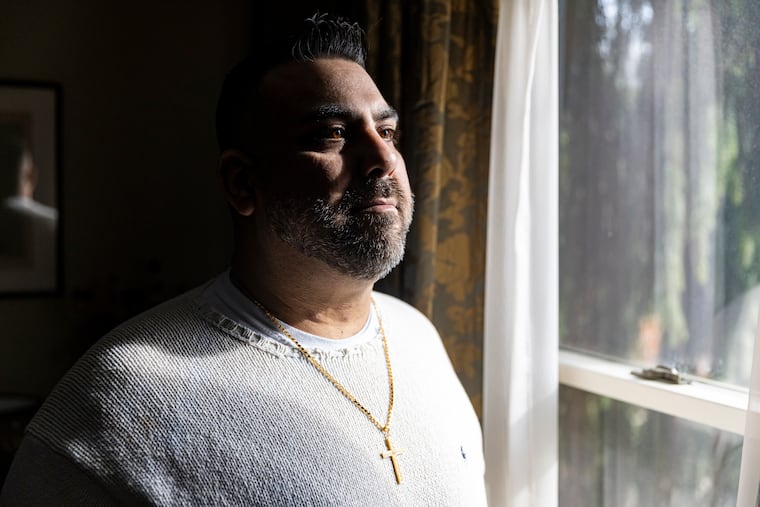Professors shouldn’t be fired because of their tweets — even if racist or antisemitic
It's not fair that Cabrini University fired Kareem Tannous for antisemitic tweets. If every remark that offends someone is placed out of bounds, a professor could be fired for pretty much anything.

Readers, it’s time to fess up.
You might have called upon Penn to fire law professor Amy Wax for her history of racist remarks. But when Cabrini University dismissed accounting professor Kareem Tannous for his antisemitic tweets, you blasted the school for violating his academic freedom.
Or maybe you defended Wax’s right to say what she thinks, no matter whom she offends, yet applauded Cabrini when it fired Tannous, whose rights somehow don’t matter as much.
Step right up to the censorship merry-go-round. And where it stops, nobody knows. You get to huff and puff when someone in your own political column gets muzzled, then you go ahead and censor someone whose views you don’t share.
Let’s start with Wax, who has declared that the country would be “better off with fewer Asians” and that “on average, Blacks have lower cognitive ability than whites.” I have written several columns condemning her views as inaccurate and reprehensible, but insisting that she retains the right to express them — just as the rest of us have the right to denounce them. But nobody atop the university — or the government — should be able to determine what’s so hateful that none of us should hear it.
That makes me a distinct minority at Penn, where thousands of students and faculty members have signed petitions calling for Wax’s dismissal. Their most common argument goes like this: Her statements make students feel unsafe. And when they feel that way, they can’t learn.
But that’s precisely what Tannous’ critics said after he published tweets with the hashtag #ApartheidIsrael and likening Israel to Nazi Germany. According to the watchdog group StopAntisemitism, which dubbed Tannous its “Antisemite of the Week” in July, his tweets “created a manifestly unsafe environment for Jewish students.”
» READ MORE: Antisemitism vs. anti-Semitism: Which is worse? | The Grammarian
Nonsense, say Tannous and his apologists. He was criticizing Israel, not Jewish people writ large. And besides, he’s a tenure-track professor: He should have the freedom to say what he thinks.
So where have these people been during the campaign against Amy Wax? Penn has convened a faculty committee to consider “major sanctions” against Wax. But I haven’t heard any of the people who are defending Tannous’ free speech rights say that Wax should have them, too.
Nor have I heard anyone in Wax’s camp raise their voice on behalf of Kareem Tannous.
It feels a lot like free speech for me and not for thee.
It feels a lot like free speech for me and not for thee.
Let me be clear: I find Kareem Tannous’ tweets erroneous and abhorrent, just like Amy Wax’s remarks were. The idea that Tannous was just attacking Israel — and not Jews — is patently absurd. He wrote that the U.S. government is “zio [that is, Zionist] controlled,” which echoes one of the oldest tropes in the antisemitic playbook: the Jew as a behind-the-scenes puppeteer, pulling all the strings. He also wrote that Adolf Hitler was Jewish, another long-standing lie in the same litany.
But I don’t want Cabrini — or anybody else — scrutinizing everything Tannous tweets. Then all of us will be looking over our shoulders, wondering if what we said could get us fired.
Tannous’ classroom is a different story. If he singled out Jewish students for abuse — say, by calling a student a Nazi — he should be disciplined for that. He has a right to express his repulsive opinions in public, but he has no right to target individuals in his charge.
That’s because professors have a duty to treat all their students with decency and respect. You might reply that Tannous’ statements about Israel — or Wax’s comments about Black and Asian people — breached that duty, too. But if every remark that offends someone is placed out of bounds, a professor could be fired for pretty much anything.
For example, most Americans — including most Black and brown people — oppose consideration of race and ethnicity in college admissions. Nevertheless, some students would surely be insulted by professors who criticize affirmative action. Should those faculty members be disciplined, too?
That’s a formula for self-censorship, which is the enemy of real education in all times and places. Now that Cabrini has fired Kareem Tannous, other professors who oppose Israel will think twice before they say so out loud. And so will anyone who rejects affirmative action — like Amy Wax does — if Penn dismisses her.
The only solution is to step off the censorship merry-go-round and let them both speak their minds. And if you want to fire one and not the other, stop saying you believe in academic freedom. You just want your side to win.
Jonathan Zimmerman teaches education and history at the University of Pennsylvania. He is the author — with cartoonist Signe Wilkinson — of “Free Speech and Why You Should Give a Damn” (City of Light Press).